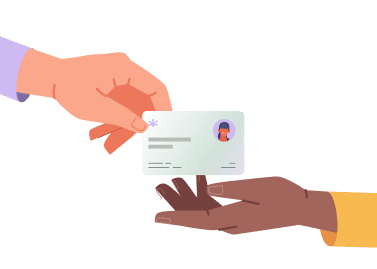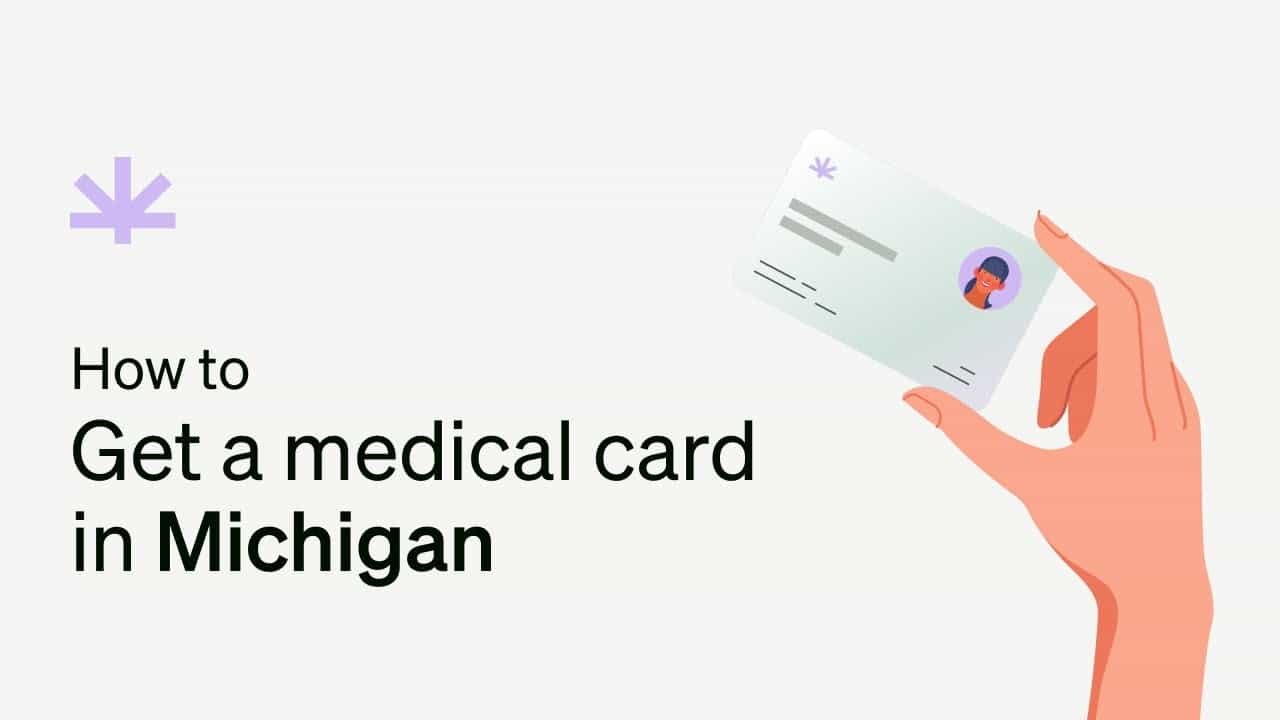Best Care, Best Value
Get a Michigan Medical Marijuana Card.
Only $99.
Quick and Easy Process
Get Approved or Your Money Back
Already a Leafwell patient?
Log in here
Trusted by 400,000+ Patients
Best Care, Best Value
We are the #1 medical card certification platform with the best value in your state.
4.9 out of 5 stars
Patient support and satisfaction are at the heart of everything we do.
Be seen in under 10 mins
Our healthcare providers are available to see you from 8 a.m. to 8 p.m. 7 days a week.
Get approved in minutes.
It’s quick, easy, and convenient.
How getting a medical marijuana card works for Michigan residents.
- Step 1

Sign Up
No appointment necessary. Register with Leafwell on any device and consult with a licensed healthcare provider in minutes.
- Step 2

Meet Your Provider
After finishing your application, you’ll be connected with a state-licensed medical professional, typically in 10 minutes or less.
- Step 3

Get Your Certification
Once your licensed medical marijuana doctor approves treatment, you’ll receive a medical cannabis certification by email.
- Step 4

Apply to the State
Apply for medical marijuana treatment through the Michigan Medical Marijuana Program (MMMP). They’ll approve or deny your request in 20 business days.
Have Questions?
See a detailed step-by-step explainer on medical marijuana cards in Michigan.
Benefits of Getting a Medical Marijuana Card
Wondering how being a part of the Michigan Medical Marijuana Program (MMMP) can transform your medical cannabis experience?
State-Specific Steps
Embarking on your journey to relief in Michigan is simple. Let our caring specialists guide you through the state-specific steps if you're looking to get a medical marijuana card online.
- Book An Appointment with Leafwell
- Get Your Certification from a Medical Practitioner
- Apply to the State of Michigan
- Get Your Approval By Email

Watch this video on how to get a medical card in Michigan
Best Care, Best Value
Retail price as of 04/12/2024
What You Pay with Leafwell
You’ll save more when you book your consultation with Leafwell. Get your money back if not approved.
Qualifying Conditions
According to Michigan law, you may be approved for a Michigan medical marijuana card if you have a debilitating qualifying medical condition, including:
- AIDS/HIV
- Alzheimer’s Disease
- Amyotrophic Lateral Sclerosis (ALS)
- Arthritis
- Autism/Asperger Syndrome
- Cancer
- Cerebral Palsy (CP) and Similar Conditions
- Chronic Pain, Muscle Pain, and Other Types of Pain
- Crohn’s Disease
- Glaucoma
- Hepatitis (Hepatitis A, Hepatitis B, and Hepatitis C)
- Inflammatory Bowel Diseases (IBDs)
- Nail-Patella Syndrome
- Obsessive Compulsive Disorder (OCD)
- Parkinson’s Disease (PD)
- Post-Traumatic Stress Disorder (PTSD)
- Rheumatoid Arthritis (RA)
- Spinal Cord Injury (SCI) and Spinal Cord Diseases (SCDs)
- Tourette Syndrome
A chronic or debilitating disease or medical condition or its treatment that produces one or more of the following:
- Cachexia or wasting syndrome
- Chronic or serious pain
- Severe nausea
- Seizures (including but not limited to those characteristic of epilepsy
- Severe and Persistent Muscle Spasms (including but not limited to those characteristic of multiple sclerosis)
Convenient, Quality Care When You Need It Most
With Leafwell, you'll be matched up with a highly knowledgeable, empathetic, licensed medical marijuana doctor or provider.

What You Need to Know
Apply NowEligibility / Patient
To apply for a medical marijuana card in Michigan, you must be a legal resident of the state. Patients must be aged 18 or over to apply for a medical marijuana card for themselves.
Caregiver
Caregivers must be aged 21 or over. A caregiver should fill out their application form; their name must also be listed on the patient’s application form. Caregivers must not have any felonies relating to drugs or violence and have not been convicted for any crime in the past 10 years.
A court-appointed legal guardian or Medical Durable Power of Attorney (MDPOA) with the authority to sign documents and make medical decisions can also apply on behalf of the applicant.
Can Minors Qualify?
Yes. Minors can have caregivers apply on their behalf. Minor patients also need two doctors’ MMJ certificates to submit along with their applications. At this time, Leafwell does not qualify minor patients in Michigan online.
What You Need
You’ll need to provide the following to apply for a Michigan medical marijuana card:
Medical Marijuana Recommendation
Once approved after your medical evaluation, your healthcare provider will submit your medical marijuana recommendation to the state so you can complete your application.
Proof of Identity
You will need a government-issued photo ID, such as a Michigan license, state ID card, or government-issued document (such as a birth certificate/passport) with a copy of MI voter registration.
Proof of Michigan Residence (Optional)
Use a Michigan driver’s license or state ID as proof of residency to ensure your new state card is printed with a photo.
Next Steps After Approval
Congratulations on getting your medical certification! You’re almost there, but there are a few more steps to complete to get your Michigan medical marijuana card. Let’s dive in!
- Before You Start: What You’ll Need
- A credit or debit card for payment
- A valid photo ID
- Download certificate: You can download your doctor’s certificate immediately if they approve you.
- Submit Certification and Application: Log into the Michigan medical marijuana program website to submit your doctor’s certificate and application within 30 days.
- Get a Card: Receive your medical card for marijuana from the state within 30 days.
- Start Shopping: Legally purchase medical marijuana products from a licensed dispensary.
How to Renew Your Card
You should renew 60 days before your card’s expiry date and link your records before you go through the normal renewal process. If your medical card has already expired/lapsed in the state system, you must apply again as a new patient after linking your existing registration record. Otherwise, the process to renew your card looks a lot like getting your medical card for the first time. You can see a full step-by-step explainer and start the process on our Michigan renewal page.
Legal Topics
In 2016, Governor Rick Snyder signed a package of bills that allowed the operation and regulation of medical cannabis dispensaries and allowed the use of non-smokable forms of cannabis, such as topicals and edibles.
The Michigan Regulation and Taxation of Marihuana Act (you may see this called the Michigan Medical Marihuana Act) passed in 2018 allows persons aged 21 and over to possess up to 2.5 ounces of cannabis in public, up to 10 ounces at home, and grow marijuana (up to 12 plants) at home. It also set up a system for the state-licensed cultivation and distribution of cannabis, with sales subject to a 10% excise tax (in addition to the state’s 6% sales tax). The law was enacted on December 6, 2018, and the first dispensaries opened to the public on December 1, 2019. The Cannabis Regulatory Agency (CRA), also called the Marijuana Regulatory Agency, is in charge of enforcing the policies of the Michigan Medical Marihuana Act.
Caregivers
Caregivers are designated by the patient, who has agreed to assist with a patient’s medical use of marijuana and meets the requirements stated below.
Minor patients (under 18 years old) require a caregiver.
Caregiver Requirements:
- Caregiver must be at least 21 years of age.
- Never convicted of a violent or drug-related felony.
- Primary caregivers must not have committed a felony within the last 10 years.
- Patients may designate one caregiver. Caregivers can have up to five patients.
Caregiver Registration (State):
- A patient must designate their caregiver on the application. Those applying with a caregiver must complete a paper application. There is no fee to become a caregiver. No mistakes or white-out on paper applications are allowed.
- Refer to the caregiver application and instructions for initial and renewal adult patients who would like to apply with a caregiver.
- For existing patients who want to add a caregiver, refer to the add/change caregiver form.
- For minor patients and their caregiver(s), refer to the minor application.
- Your valid ID must be submitted with the patient’s application.
Reciprocity
Some states accept out-of-state medical marijuana cards in a process called reciprocity. The following states accept medical cannabis cards from Michigan or otherwise allow access to cannabis:
- Arizona
- Arkansas *
- Hawaii *
- Louisiana
- Maine
- Nevada
- New Hampshire
- New Jersey *
- New Mexico
- Oklahoma *
- Puerto Rico
- Rhode Island
- U.S. Virgin Islands *
- Utah * (up to two 21-day periods in a calendar year)
- Washington D.C.
*Visitors must complete a visiting patient application with the state program.
FAQs
Check out our MI FAQ page for more frequently asked questions in Michigan.
How much does a Michigan medical marijuana certificate and card cost?
An online consultation for a Michigan medical card includes a certificate good for two years. You’ll only be charged if approved. Plus, now you can sign up with a friend, and each of you will save 10% on your consultation.
Patients will also pay a $40 application fee to the Michigan Medical Marijuana Program.
- $198 Minor certification (includes two certificates)
- $40 State caregiver application fee*
*State fees are not included with Leafwell fees and are paid directly to the state.
What medical conditions qualify for a medical marijuana card in Michigan?
In Michigan, you may be approved for a medical card if you have a qualifying condition, including:
- AIDS/HIV
- Alzheimer’s Disease
- Amyotrophic Lateral Sclerosis (ALS), aka Lou Gehrig’s Disease
- Arthritis
- Autism
- Cancer
- Cerebral Palsy
- Chronic Pain
- Colitis
- Crohn’s Disease
- Glaucoma
- Hepatitis C
- Inflammatory Bowel Diseases (IBDs)
- Nail-Patella syndrome
- Obsessive-Compulsive Disorder (OCD)
- Parkinson’s Disease
- Post-Traumatic Stress Disorder (PTSD)
- Rheumatoid Arthritis
- Spinal Cord Injury
- Tourette’s Disease
- Ulcerative Colitis
- A chronic or debilitating disease or medical condition or its treatment that produces one or more of the following:
- Cachexia or wasting syndrome
- Chronic or severe pain
- Severe nausea
- Seizures (including but not limited to those characteristic of epilepsy)
- Severe and Persistent Muscle Spasms (including but not limited to those characteristic of multiple sclerosis)
What do I need to know about applying for my medical cannabis card in Michigan online?
With Leafwell, applying for a Michigan medical marijuana card online is simple. Here’s what to expect:
- Register with Leafwell and speak to a Michigan-licensed doctor online. Consultations cost $99, and you’ll only be charged if approved.
- You and your doctor will discuss your medical records and any qualifying conditions you may have. Get approved and download your doctor’s certificate immediately.
- Submit your certificate with your application to the Michigan Medical Marijuana Program within 30 days.
- Receive your medical card from the state within 30 days and legally purchase cannabis from a licensed dispensary.
How old do I have to be to apply for a medical marijuana card in Michigan?
You must be 18 years old or older to apply for a medical card in Michigan.
Minor patients may apply for a medical card with consent from a custodial parent or legal guardian.
Caregivers must be 21 or older.
Can I be/have a caregiver for a medical marijuana patient in Michigan?
Yes, medical marijuana patients in Michigan can have a caregiver. Patients must complete a paper application if designating a caregiver.
Caregiver Requirements:
- Must be at least 21 years of age.
- Never convicted of a violent or drug-related felony.
- Primary caregivers must not have committed a felony within the last 10 years.
- Patients may designate one caregiver. Caregivers can have up to five (5) patients.
Here’s how the caregiver process works:
- Your patient must designate you as their caregiver on a mail-in paper application. No mistakes or whiteout on paper applications!
- If your patient is already active and registered, they can add you using this form.
- A copy of the front of your valid state-issued driver’s license or personal identification card must be included with the patient’s application.
- There is no additional fee to become a caregiver.
State Resources:
- Adult patient application and instructions
- Add or Change Caregiver (for active registered patients)
- Removing a caregiver
- Caregiver FAQ
How do I apply for the state program in Michigan?
Here’s how to apply to the Cannabis Regulatory Agency (CRA) :
Before you start, have these supporting documents ready:
- Physician/Doctor Certification Form (from Leafwell)
- MI License, MI State ID, or government-issued document that includes your name and date of birth with a copy of Michigan voter registration
- Proof of Residency Requirements
Getting Your Michigan Medical Card
- Go to http://www.michigan.gov/CRAonline and click Register for an Account.
- Fill out all the Required Fields.
- Check that you have read, understand, and agree to the Terms of Service.
- Click Continue.
- For Contact Type, select Individual.
- Enter your Contact Information: First Name, Middle Initial, Last Name, and Date of Birth must match your proof of Michigan residency.
- Select Mailing from the Address Type drop-down menu and provide your mailing address.
- Click Submit.
- Now you will be back at the Home page. This will show your account has been completed and you may now log in.
- Log in with the user name or email address and password you created the account with: https://michigan.gov/CRAonline
- Click on the Registry Cards tab, then click on Create an Application.
- Read the General Disclaimer, check the acceptance box, and click Continue Application.
- Click on the Registry Cards drop-down, and select Patient Only Registry Application then click Continue Application.
- Click on the Select from Account.
- Verify your Mailing address is checked and click Continue. After verifying your information, click Continue Application.
- Review your Current Address. Select Yes or No if you need to change your address.
- From the drop-down menu select what type of Proof of Residency you will use.
- If you select Michigan State Issued Driver’s License Number or Personal Identification, fill in the required (*) fields.
- If you select I’ll upload my Michigan voters Reg and a valid Government Issued Document with my name and birthdate, follow these steps:
- (No Name Change) – If you do not need to change your name, select No.
- (Name Change) – If you need to change your name, select Yes. Fill in the required fields (*) with your new Name and Date of Birth.
- Click Continue Application.
- Note: If you receive an error when submitting your Driver’s License/ID info, select the “I’ll upload my MI Voter…” option from the drop-down and follow the steps above.
- Select from the dropdown list that your physician will certify you online.
- Type in the Michigan Physician/Doctor License Number, then press tab (physician’s info will auto-populate) and click Continue Application.
- If you selected I’ll Upload my MI Voter Reg and a Government Issued Document with my name and birthdate for proof of residency, you will now be asked to upload those documents. Make sure your documents are downloaded to your computer or device before moving on.
- Review the application info, edit each section if needed, and print a copy for your records. Read the Attestation, check the Attestation Certification Box, and click Continue Application.
- Once you have reviewed the application fee, click Continue Application.
- Choose a method of payment and click Next.
- Fill in all Required Fields (*) for the payment type you selected, click Next then click Pay Now.
- Once your payment has been successfully submitted, you will receive confirmation that your application has been submitted. Write this record number on the summary you printed, or you may print this page for your records.
- Wait for your application to be processed — you don’t need to do anything.
- Once your Leafwell Physician receives notice of your pending application, they have 15 days to complete their portion of your application.
- Once your application has been processed, you will receive an email from noreply@accela.com. This email may go to your Spam or Junk folder.
- You may check your application status by logging into the Accela Citizen Access Portal (www.Michigan.gov/CRAonline) and clicking the Registry Card tab.
- Receive your ID card in the mail within 30 days of the application. Your card will be valid for 2 years.
Additional Resources: